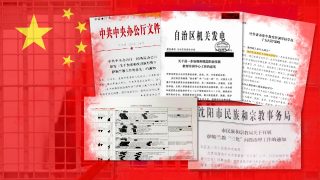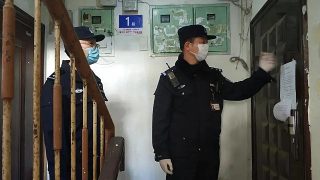Catholic bishop Guo Xijin is on the run from Chinese police after refusing to bring his church into a Catholic association approved by the ruling Chinese Communist Party.
Guo, 61, fled the custody of state security police who had him under close guard since Nov. 9 in a bid to pressure him into joining a Catholic body that Beijing says is “independent” of Rome, the Catholic AsiaNews website reported.
Police officers took Guo, an auxiliary bishop of Mindong diocese in the southeastern province of Fujian, to a meeting in the coastal city of Xiamen at which he was supposed to agree to join the “independent” church, and also to persuade his fellow Catholics to do the same, the report said.
“He was loaded into a car to take him to Xiamen, but due to the bishop’s opposition, the police then decided to take him to Ningde to submit him to new tactics of persuasion,” the report said.
“This afternoon, Msgr. Guo escaped from the [police] and returned home to Luojiang,” it said. “His faithful are sure that the police will come looking again for him soon.”
Repeated attempts to contact Guo on Thursday were unsuccessful.
Guo has been persecuted by the Chinese authorities since Beijing and the Vatican signed a controversial deal in September 2018 over the appointment of bishops, amid warnings that religious repression targeting unofficial churches would likely intensify.
The controversial deal eliminated the division between bishops and churches recognized by the government-backed Catholic Patriotic Association and those appointed by Rome.
Rome recognized seven bishops appointed by the Chinese state, and the agreement also saw the founding of a new Catholic diocese in Chengde, in the northern province of Hebei.
But Guo has yet to be recognized by Beijing, because he refuses to sign a document committing himself to membership of an “independent church,” and out of solidarity for persecuted coreligionists.
But President Xi Jinping’s interpretation of that deal has been to make joining the ruling party’s “independent church” a condition for Catholics living in China to continue to practise their faith.
In Guo’s diocese of Mindong, only 10,000 of its 90,000 followers are members of the state-backed church, while the rest have long been served by Vatican-backed priests, nuns, and laypeople. Only 12 priests are members of the state’s Chinese Patriotic Catholic Association.
A betrayal of beliefs
Bob Fu, founder and president of the U.S.-based Christian rights group ChinaAid, said the agreement with the Vatican had been a betrayal of Chinese Catholics on many levels.
“As far as religious persecution of Chinese Catholics goes, that deal wasn’t just a political betrayal; it was also a betrayal of their beliefs,” Fu told RFA.
“How could the Vatican allow an atheist regime to select bishops?”
In November 2018, authorities in China’s eastern province of Zhejiang detained Bishop Peter (in Italian, Pietro) Shao of Wenzhou, a Catholic bishop recognized by the Vatican but not by the ruling Chinese Communist Party—weeks after the agreement was reached.
Beijing claims that all religions are subordinate to the Chinese Communist Party within China’s borders, and that religious believers must “be subordinate to and serve the overall interests of the nation and the Chinese people … and support the leadership of the Chinese Communist Party.”
Officially an atheist country, China has an army of officials whose job is to watch over faith-based activities, which have spread rapidly in recent decades.
Party officials are put in charge of Catholics, Buddhists, Taoists, Muslims, and Protestants. Judaism isn’t recognized, and worship in non-recognized temples, churches, or mosques is against the law.
Reported by Jia Ao for RFA’s Mandarin Service. Translated and edited by Luisetta Mudie.
Source: Copyright © 1998-2016, RFA. Used with the permission of Radio Free Asia, 2025 M St. NW, Suite 300, Washington DC 20036. https://www.rfa.org.



